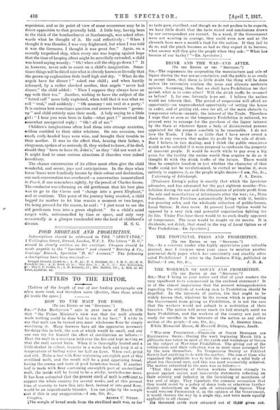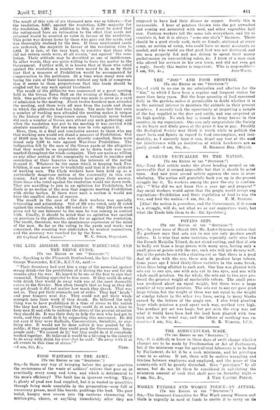THE WORKMEN OF GOVAN AND PROHIBITION.
ITO THE EDITOR OF THE " SPECTATOR." 1
SIR,—May I bring to your notice and that of your readers the very significant facts summarized in the enclosed statement ? It is of the utmost importance that the present misapprehension regarding the attitude of working men to Prohibition should be dispelled. In the interests of justice, the fact ought to be widely known that, whatever be the reason which is preventing the Government from giving us Prohibition, it is not the case that the workers would not submit to a restriction of their luxuries. The nation will never reach its full strength until we have Prohibition, and the workers of the country are just as ready for sacrifice in the interests of the nation as any other " WAR-TIMB PR OtlIBITION.—PLEBISCITE OF GOVAN SHIPYARDS AND ENGINEERING SHOPS.—During the week beginning March 11th a plebiscite was taken in most of the yards and workshops of-Govan on the subject of War-time Prohibition. The giving out of the voting-cards and their collection was in most cases arranged for by the men themselves. No Temperance Society or Political Society had anything to do with the matter. The aim of those who organized the plebiscite was to test the views of a solid body of about ten thousand men, and this was most successfully achieved. The motion submitted to the men was as follows :— ' That this meeting of Govan workers desires strongly to protest against unjust and inaccurate statements reflecting on their sobriety and industry in the furnishing of munitions of war and of ships. They repudiate the common accusation that they would resist by a policy of down tools or otherwise further drastic restrictions on the sale of intoxicating liquors. They Would WELCOME PROHIBITION if, in the opinion of the Government, it would shorten the war by a single day, and were made equally applicable to all classes.'
Six thousand cards were returned out of 10,849 given • mit. The result of this vote of six thousand men was as follows :—For the resolution, 3,607; against the resolution, 2,398—majority for the resolution, 1,209. In addition to this, it must be noted that the voting-card bore an intimation to the effect that cards not returned would be counted as votes in favour of the resolution. This point was driven home by those who gave out the cards, and was thoroughly realized by the men. If these uureturned cards are reckoned, the majority in favour of the resolution rises to 5,853. It is fair, at the very least, to consider that those who (lid not return cards were, at all events, ` not against' the reso- lution. Their attitude may be described as one of indifference. In other words, they are quito willing to leave the matter to the Government. Further still, it is known that of those-who voted against the resolution a number were moved to do so by their fear that a measure of Prohibition would be accompanied by compensation to the publicans. At a time when many men are facing the ruin of their businesses without any talk of compensa- tion it seems to them preposterous that this trade should be singled out for any such special treatment.
The result of the plebiscite was announced at a great meeting held in the Govan Town Hall on the evening of Sunday, March 18th. One portion of the voting-card was made to serve as a card of admission to the meeting. About twelve hundred men attended the meeting, and these were all men from the yards and shops in which the plebiscite had been taken. The mere fact that such a number of working men attended the meeting makes it unique in the history of the temperance cause. Certainly never before did such a number of Govan men attend any such gathering; and when the resolution was put to the meeting it was carried with absolute unanimity. Not one man rose to vote against it.
Here, then, is a final and conclusive answer to those who say that working men would not stand a measure of Prohibition. Out of 10,649 men in Govan who were directly consulted, there were found only 2,398 to vote against War-time Prohibition. The indignation felt by the men of the Govan yards at the allegation that they would be so unpatriotic as to down tools was most marked throughout the whole campaign. They are quite as willing as any other section of the community to submit to sacrifice and restriction of their luxuries when the interests of the nation demand it. Whatever be the cause which is keeping back Pro- hibition, it can never now be truthfully said that it is the attitude of working men. The Clyde workers have been held up as a particularly dangerous section of the community in this con- nexion. And now the Clyde workers have given their answer. Even those who voted against the resolution would woe down tools. They are unwilling to join in an agitation for Prohibition, but there is no section of the men that suggests meeting Prohibition with strike tactics. If there were such a section it would not have the smallest chance of success.
The result in the case of the dock workers was specially interesting and astonishing. Out of 195 who voted, only 32 voted against the resolution, while 163 voted for it. Only 250 cards were given out by one labourer to the men he was coming in contact with. Finally, it should be noted that no agitation was carried on previous to the plebiscite, either for or against the resolution. The result, therefore, was the spontaneous expression of the mind of the men. So far as the voting in the yards and works was concerned, the counting was undertaken by neutral committees, and the accuracy was vouched for by the firms.



























 Previous page
Previous page